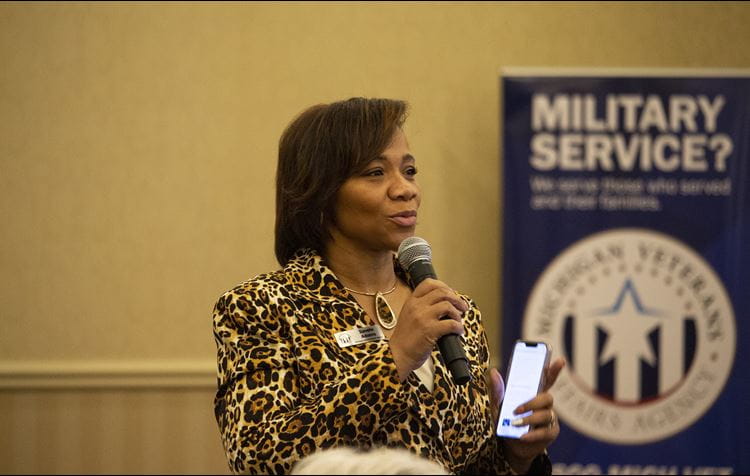The web Browser you are currently using is unsupported, and some features of this site may not work as intended. Please update to a modern browser such as Chrome, Firefox or Edge to experience all features Michigan.gov has to offer.
MVAA Education Conference '22: The keys to veteran success
October 07, 2022

MVAA Director Zaneta Adams on the Veteran-Friendly Schools Education Conference.
There was nothing easy about earning my bachelor’s and law degrees after serving in the Army. I had severely hurt my back preparing to deploy, I was a young mother dealing with pain, surgeries and depression and there was no veteran support to speak of. Fortunately, my dean at Western Michigan University Cooley Law School recognized my potential and encouraged me, telling me I’d be a rock star.
I took it from there, getting active in student veteran and legal groups and going on to a career of representing veterans both in and out of the legal system. I accomplished what I set out to do partly because someone had looked at me and said I can do better than OK.
And that’s exactly what our veterans need on their unique education journeys – someone by their side to offer guidance and encouragement, but also to connect them to the appropriate resources they need to be rock stars in their own right.
At our second annual Veteran-Friendly Schools Education Conference, Sept. 26-27 in Grand Rapids, we heard from both student veterans and advocates about the challenges and opportunities facing our veterans. On one hand, our student veterans have more support than ever at colleges across Michigan. On the other, it can be difficult to navigate the maze of benefits and to find that meaningful connection on campuses where our veterans often feel like they don’t fit in.
It's OK to ask for help
After transitioning out of the Navy, Jake Inman was homeless while attending college courses in other states with aspirations of becoming a mechanical engineer. A husband and a father, Inman was searching for the right path.
He found it at Washtenaw Community College (WCC), where he enrolled in a pre-engineering transfer program with the University of Michigan and is now in his second year. Inman credits Jan Militello and Carol Osborne with WCC’s veteran-support staff for furthering his journey.
“If it wasn’t for Carol and Jan, I don’t know where I’d be,” he said.
Marine veteran Jake Kokowicz found his “brotherhood” at Saginaw Valley State University after touring several Michigan colleges. Kokowicz, who had lost an arm and sustained head injuries in a motorcycle accident, said comradery with fellow veterans was the main attribute he was looking for in a college.
Kokowicz now helps out in SVSU’s Military Student Affairs Office as he pursues a master’s degree in social work. Like many former service members, he noted that he’s fiercely independent.
“It was so hard for me to ask for help. I take pride in doing things myself,” Kokowicz said. “That’s the biggest piece of advice I would have for veterans: It’s OK to ask for help. It’s OK to reach out.”
Building connections
We now have 63 Veteran-Friendly Schools in Michigan, and they offer a variety of innovative and evolving programs and assistance for former service members. Several schools discussed their offerings at the conference.
Wayne State University offers an accelerated 18-month nursing program for veterans who have 30 college credits or a military healthcare background, said Matthew McLain of the university's Office of Military & Veterans Academic Excellence.
Wayne State also provides Warrior Reboot – a one-week “boot camp” to prepare student veterans for math and English placement exams and to expose them to resources and connections to help them thrive.
UM-Dearborn has a veteran success team that integrates the financial aid, registrar and all other relevant offices through a single point of contract – Veteran Affairs Coordinator Tom Pitock – to fully serve its student veterans.
Grand Valley State University offers Veteran Promise, a first-in-the-nation program that guarantees a spot at GVSU for high-school graduates who enlist in the military, noted Jill Hinton Wolfe, GVSU’s veterans resource manager.
But just as important as any program is Wolfe’s commitment to building trust and staying in touch with her student veterans. This was underscored by her work with Army veteran Enrique Leon, who enrolled at GVSU during the COVID-19 pandemic but, like so many veterans, felt out of place and overwhelmed.
“When I started at Grand Valley, I thought, you know, this is too much,” Leon said. “I just got out of the military, I’m surrounded by 18-year-olds, pretty much the oldest one in the classroom, I have mental health issues, and I didn’t want to continue.”
Leon sent a text to Wolfe that was he going to drop out. But Wolfe, a veteran herself, had developed a connection with Leon and sent a simple text back:
“DON’T QUIT.”
He didn’t. Leon stayed in school and continues studying to be a Spanish teacher and interpreter. He also assists other student veterans and speaks at faculty orientations to help professors understand what it means to be a veteran in the classroom.
Today, Leon keeps a reminder to be resilient. It’s a simple tattoo on his forearm, and it reads: “DON’T QUIT.”
To all of our student veterans, I say don’t quit what you’re doing, no matter how difficult or overwhelming it may seem. Keep studying, keep advocating for one another and keep fighting for your futures as rock stars.
Call 1-800-MICH-VET (1-800-642-4838) or visit the MVAA's education webpage to learn more about veteran education benefits.